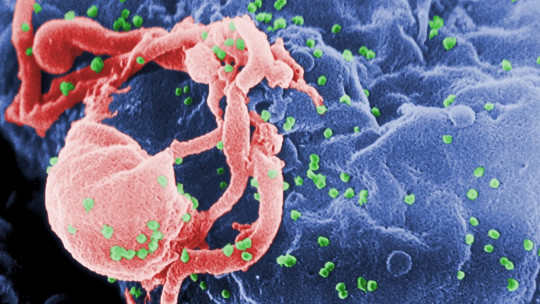HIV and AIDS: these two words refer to a painful reality very present in our lives. HIV infection and its evolution towards AIDS is, along with cancer and dementia, one of the serious diseases for which even today science has not found a cure.
In the case of HIV, in addition to the effects of the disease itself, we find that It represents a powerful stigma at a social level. And the detection of the human immunodeficiency virus and the idea of suffering and living with AIDS is a hard blow that can cause serious psychological problems.
This article aims to reflect the difficulties that a person with HIV can go through on a psychological level especially in the first moments.
HIV and AIDS: what are they?
Before going into detail regarding the psychological effects of its detection and suffering, it is important to keep in mind that, although linked, HIV and AIDS are not synonyms.
The acronym HIV refers to the human immunodeficiency virus, a retrovirus that affects the human immune system and causes its progressive deterioration by multiplying and destroying the lymphocytes (immune system cells) of said system. People carrying HIV They are known as seropositive and up to ten years can go by without obvious symptoms.
AIDS or acquired immunodeficiency syndrome refers to the most advanced phases of this disease, in which HIV has caused the immune system to not be able to respond adequately to infections. These infections are called opportunistic.
Infection and contagion
The ways of transmitting this disease, known today by a large majority of the population, are through contact between different types of mucous membranes and fluids, such as semen, vaginal fluids and blood.
Specifically, The most common form of infection is through unprotected sexual contact (whether vaginal or anal), followed by infection through blood contact by sharing syringes or razor blades. Mother-child transmission can also occur in pregnant women who do not follow any treatment, both during childbirth and while breastfeeding.
On a sexual level, it should also be taken into account that some affected people believe that due to their condition they can have unprotected sexual relations with other people with HIV. It is important to note that this is not correct, since This virus is highly mutable and there are multiple strains so a person infected with one type of strain can infect others and produce an HIV superinfection.
Get tested
We have unprotected sex or we prick our foot with a syringe lying in a park. Perhaps it was an oversight, or perhaps the subject believed that his sexual partner seemed healthy and did not have any type of infection. It is also possible that we have suffered sexual assault. After experiencing the high-risk practice, concern may arise that the person in question was HIV positive, and with uncertainty, panic and anxiety may appear.
The next step would be to get tested. This is a fundamental aspect and of great importance when it comes to being able start antiretroviral treatment as soon as possible and at the same time prevent infections. But many people fear and even avoid getting tested for fear that they might test positive.
This represents serious harm to them in all areas, since if they are affected, it delays the treatment of this disease, makes it easier for them to infect other people and at the same time doubts arise about their possible illness, which sometimes In turn, it will generate a deep and continued level of frustration, anxiety and fear.
Detection problems
It must be taken into account that There is a window period in which the tests are not reliable , and may test negative despite having the infection. This is because the immune system has not yet developed antibodies against the virus, at which time seroconversion occurs. This period is generally between three and six months, although it can be longer depending on the case (for example, in patients undergoing chemotherapy or radiotherapy).
However, many people do not realize the risk they run or do not believe they can be infected because they do not perceive obvious symptoms in themselves or in their sexual partners. This may cause the subject not to be treated and may even infect others by not knowing their serological status.
Thus It is essential to raise awareness among the population (especially high-risk women) of the need to have it done at least once a year, and make it easier for them to do it safely. In this sense, there are numerous organizations that have rapid tests and knowledge in this regard that can be of great help.
The diagnosis and the moments after
The moment of communication of the diagnosis is one of the most difficult, and during this time it can be of great importance to have counseling and orientation services in the services that are responsible for carrying out the test. The notification of this fact is a hard blow for and can cause severe shock for the patient, whose reactions can range from a panic attack to the absence of an immediate reaction.
The main thing at this moment is to offer emotional support while providing information regarding what the infection entails and means, teaching preventive and self-management measures and motivating the subject so that they adhere to the treatment.
Likewise, another factor of great difficulty for the diagnosed person occurs when communicate the fact to those around you and to potential sexual partners that you have had recently. In fact, many subjects hide their condition and withdraw into themselves without seeking any type of help or emotional support. It is not uncommon for there to be adaptive syndromes, acute stress disorder or even post-traumatic stress disorder.
As with other serious chronic illnesses, the subject is likely to experience grief, with a period of initial denial, anger, negotiation, resignation and acceptance of the fact. In some cases these people may have suicidal thoughts and even actual suicide attempts, making psychological and environmental support essential. It can be of great help participation and attendance in support groups, problem-solving training and various psychological and relaxation techniques.
Living with HIV: psychological effects
HIV infection is a chronic problem that currently has no cure and represents a major health problem worldwide. Fortunately, despite having no cure, medical advances and antiretroviral treatment have meant that in those cases that are treated, the disease has gone from being fatal in a few years to being controllable and becoming a chronic disease.
However, its detection is a hard blow for those who suffer from it and the existence of a large number of changes in the lives of patients, who in addition to the disease itself usually experience different disorders such as depression, panic attacks and anxiety as a consequence of knowing that you have this condition.
Somatic symptoms are also likely to occur due to anxiety, which people may relate to their condition. It is not uncommon for them to appear distracted, irritable or feel guilty for having been infected. Self-esteem can greatly decrease, and it is not unusual for anhedonia, a feeling of emptiness, and fear to occur.
At a social level, it is not strange that the subject tends to withdraw and isolate himself , both due to their emotional state and the fear of infecting third parties. In the same way, HIV entails a stigma that can cause other people to avoid contact with the subject or cause them to consider that they are going to be rejected by their environment, causing serious harm at a social and work level.
At a sexual and emotional level, there is also usually significant inhibition, even when there is a stable partner who knows the subject’s seropositivity and when protection mechanisms are used. All of this enhances the presence of affective alterations which in turn is harmful since stress decreases the performance of the immune system.
It must also be taken into account that maintenance of treatment is essential and for life, even though it may cause side effects. In addition to the subject itself, you must also prepare the environment and offer advice and guidance.
concluding
The aforementioned aspects refer to different problems that people who are diagnosed with HIV may have when diagnosed due to knowledge of the disease itself, especially in the early stages. But Being diagnosed with this disease does not mean living an unhappy life. The person with HIV today can have a normal, long and full life.
Bibliographic references:
- Prieto, F.; Casaña, S.; Ibarguchi, L. and Pérez, S. (2007) Psychological effects of people affected by HIV-AIDS: Lines of action. Positive Support Association.









